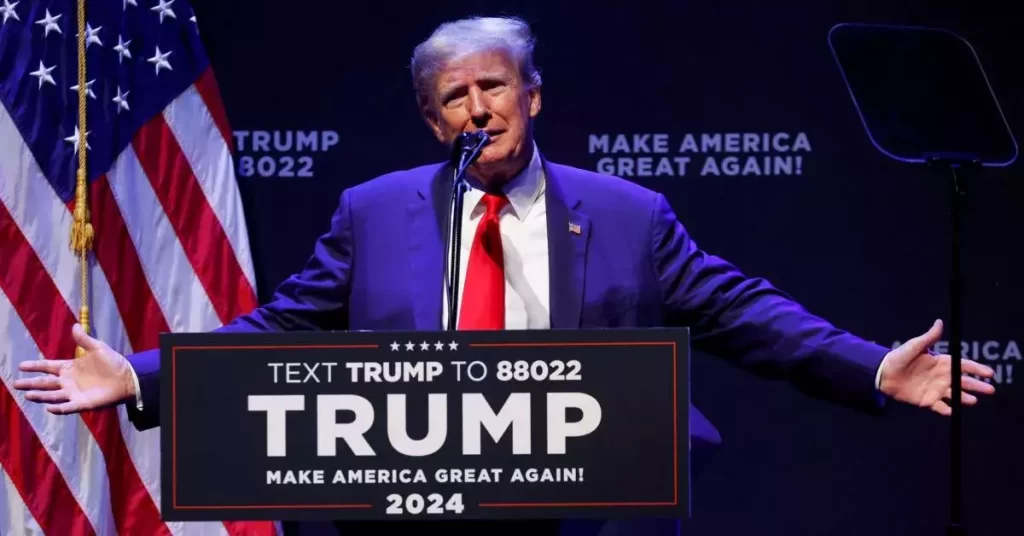Donald Trump Dominates Nomination Race
With the Republican presidential race heating up, former President Donald Trump has established a commanding lead in polls despite ongoing legal issues. As the Grand Old Party contenders vie for support, Florida Governor Ron DeSantis, former Vice President Mike Pence, entrepreneur Vivek Ramaswamy, former South Carolina Governor Nikki Haley, Senator Tim Scott, and former New Jersey Governor Chris Christie are making their presence felt. These challengers are strategizing and campaigning across the country, particularly in Iowa, the state that kicks off the nomination process. While debates loom as critical moments, Trump’s reluctance to participate may impact the dynamics of the race.
Trump’s Dominance and Challengers’ Strategies
Donald Trump’s strong polling numbers have set him apart as the frontrunner, leaving other contenders to chase his lead. Governor Ron DeSantis and his allies argue that only they, alongside Trump, possess the necessary resources and support to secure the GOP nomination. DeSantis positions himself as a potentially stronger candidate against President Joe Biden, emphasizing Trump’s difficulties with independent voters amid legal controversies. However, despite his efforts to differentiate himself, DeSantis faces challenges with stagnant poll numbers and staff changes. Other challengers like Mike Pence, Vivek Ramaswamy, Nikki Haley, Tim Scott, and Chris Christie are also focusing on their respective strategies to gain momentum.
DeSantis: The Closest Challenger
Ron DeSantis emerges as Trump’s closest competitor, yet his polling numbers trail significantly behind. The DeSantis team acknowledges the importance of appealing to “soft Trump voters and America First conservatives,” highlighting policy differences such as guns, spending, and Trump’s connections with the Saudi Royal Family. DeSantis faces the uphill battle of surpassing Trump’s popularity while tackling nervous supporters, stagnant poll numbers, and staff shake-ups. Employing a new media strategy, including scheduled interviews, DeSantis seeks to make inroads with voters and gain ground in the race.
Pence’s Contrasting Approach
Former Vice President Mike Pence focuses on the conservative aspects of the Trump-Pence administration while drawing distinctions on issues like Ukraine and entitlement programs. Pence has criticized Trump’s pressure to overturn the 2020 election results and has faced scrutiny in investigations surrounding the election. With a strong emphasis on Iowa, where evangelical voters hold significant influence, Pence aims to rally support by emphasizing border security, military support, economic revival, and American values.
Ramaswamy: The Outsider
Entrepreneur Vivek Ramaswamy presents himself as an outsider who challenges “woke” corporate culture. His campaign gains attention as he aligns himself with Trump and even suggests the possibility of pardoning the former president. Trump acknowledges Ramaswamy’s rising presence, leaving room for speculation about potential shifts in the rankings.
Haley’s Vision of a New Generation
Nikki Haley, former South Carolina Governor and United Nations ambassador, positions herself as a leader representing a “new generation” of Republicans. She aims to move beyond Trump’s influence and appeals to voters by presenting herself as a figure of the future. While polling at less than 5%, Haley focuses on surviving the early caucuses and primaries, particularly the South Carolina primary, to solidify her campaign.
Scott’s Outreach to Minority Voters
Tim Scott, the only Black Republican senator, strives to establish himself as a candidate of the future. He recognizes a trend of minority voters leaning toward the Republican Party and aims to capitalize on this shift. Scott faces the challenge of low poll numbers but remains determined to remain in the race until the South Carolina primary.
Christie’s Direct Challenge
Former New Jersey Governor Chris Christie adopts a confrontational approach by directly challenging Trump. As a former federal prosecutor, Christie criticizes Trump’s handling of classified documents and questions his integrity. Christie focuses on New Hampshire, hoping that success in the early primary will propel him forward, as it did for John McCain in 2008.
Debates and the Race Dynamics
While the challengers are banking on debates to narrow the gap with Trump, the former president has indicated his reluctance to participate due to his significant lead in the polls. The first scheduled debate in August may not feature Trump, potentially altering the dynamics and opportunities for other candidates to gain traction.
Other Contenders and Their Challenges
Asa Hutchinson, Doug Burgum, and Will Hurd face their own hurdles in the race. Burgum, the relatively unknown North Dakota governor, employs creative strategies such as offering gift cards to attract donors. Former Congressman Will Hurd of Texas hesitates to sign a pledge to support the eventual Republican nominee, concerned that it may be Trump. Hutchinson, the former governor of Arkansas, appeals directly to contributors to help him secure a place on the debate stage.
Finally, With Donald Trump commanding a substantial lead, the Republican presidential race remains highly competitive as challengers seek to close the gap. Ron DeSantis, Mike Pence, Vivek Ramaswamy, Nikki Haley, Tim Scott, Chris Christie, and others employ diverse strategies to gain support and differentiate themselves from Trump. Debates loom as crucial moments in the race, even as Trump’s reluctance to participate adds uncertainty. As the campaign progresses, the dynamics may shift, reshaping the trajectory of the GOP nomination.



